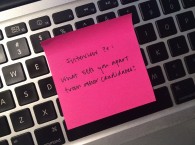So you got the interview which is an amazing first step and a pretty difficult feat. The upcoming interview is definitely make or break. Not only will the team make a decision on you as a candidate for the role you are interviewing for, but they will also decide how they feel about you as a candidate for the company overall. This post will cover how to analyze a job description to prepare for a job interview.
I like to call this “knowing what you are interviewing for”. It sounds basic, but it is important and often taken for granted. Knowing what you are interviewing for is more than just knowing the job title and position basics. It means taking a deep dive into dissecting the job description and knowing how to apply your past experience to the job being filled.
In terms of the anatomy of a job description, there are usually 4 main parts: the overview, the responsibilities, the requirements, and the desired attributes:
The Overview:
Usually a few very general sentences about the job – if the job had an elevator pitch this would be it. The most high level description will be found here and it won’t be very difficult to decipher.
- Tip: Be able to easily weave your personal story and background together with pieces of the overview to come up with a powerful one or two line statement about why this is the right role for you
The Responsibilities
The meat of the description is here. These should be read, slowly, carefully, line by line… The person who wrote this is probably going to be your direct manager and the bullets in this section are really what will be expected of you every day should you get the job.
- Tip: There are likely going to be some things you’ve done before and others that you haven’t. For those responsibilities that you’ve done before, come up with an example of a time when you have done that task very well – for those that you have not done before, think of experiences you have had that could be applied to this type of task – need clarity on a point? feel free to ask about that during the interview.
The Requirements/Qualifications
This is probably the most important section but if you have been given the chance to interview, you likely meet these already. Whoever has the most at stake in this process came up with a list of wants, needs, or maybe non-negotiables, that a candidate must have.
- Tip: If you were called in for an interview, you probably do meet many of these already, which is great! Similar to the above, identify the requirements you meet and do not meet. For those you don’t meet, make sure you are able to speak to how you would come up the learning curve or gain that credential.
The desired attributes
Sometimes these will be bundled with the qualifications (and other times on their own) but they are “soft skills” vs concrete degrees and proficiencies. A requirement may be “2 years of previous marketing experience” but a desired attribute may be “must be a self starter”.
- Tip: These are subjective and you will be taken at your word regarding whether you have them or not. That means you absolutely must be able to give examples of times when you exhibited those attributes – thinking about this ahead of time should enable you to come up with some good ones.
Let’s take an example… (via NBC)
The Basics/Overview
Job Title: Marketing Assistant/Business Segment: Cable Entertainment & Cable Studios/Company: NBC
Role Purpose: The Marketing Assistant will support two executives in the Syfy Marketing Department
You may say: “Supporting executives in a marketing department at a company like NBC would enable me to immerse myself in that function and industry and give me the ability to learn from the very best.”
Responsibilities [truncated from actual description]
- Provide professional assistance and support to the VP of Production and the VP of Creative
- Act as a liaison between executives and all internal departments and external business associates to ensure that all matters are attended to in an efficient and timely manner
- Update and maintain schedules—schedule meetings with numerous attendees as requested, reserve conference rooms and order food for meetings
- Work with IT to address any issues with equipment for executives
- Manage mass mailings of business materials and premiums for clients and contacts
- Arrange all business travel, including car service, air travel and hotels
- Draft and process travel, entertainment and business expenses
Qualifications
- Bachelor’s Degree
- Minimum 1 year work experience, including internships
- Proficient in MS Office, including Word, PowerPoint, Excel & Outlook
Desired characteristics
- Must be a self-starter, interested in learning about all facets of Marketing
- Must be detail-oriented and organized
- Must possess excellent interpersonal skills, including tact and diplomacy
- Must exercise good judgment
- Must be a flexible team player
Be prepared to: Spell it out (on the requirements front) – make sure your interviewer knows that you are proficient in MS office (for example). For the desired characteristics, give examples of specific times when you “had to be detail-oriented and organized” or “exercised good judgement”.





